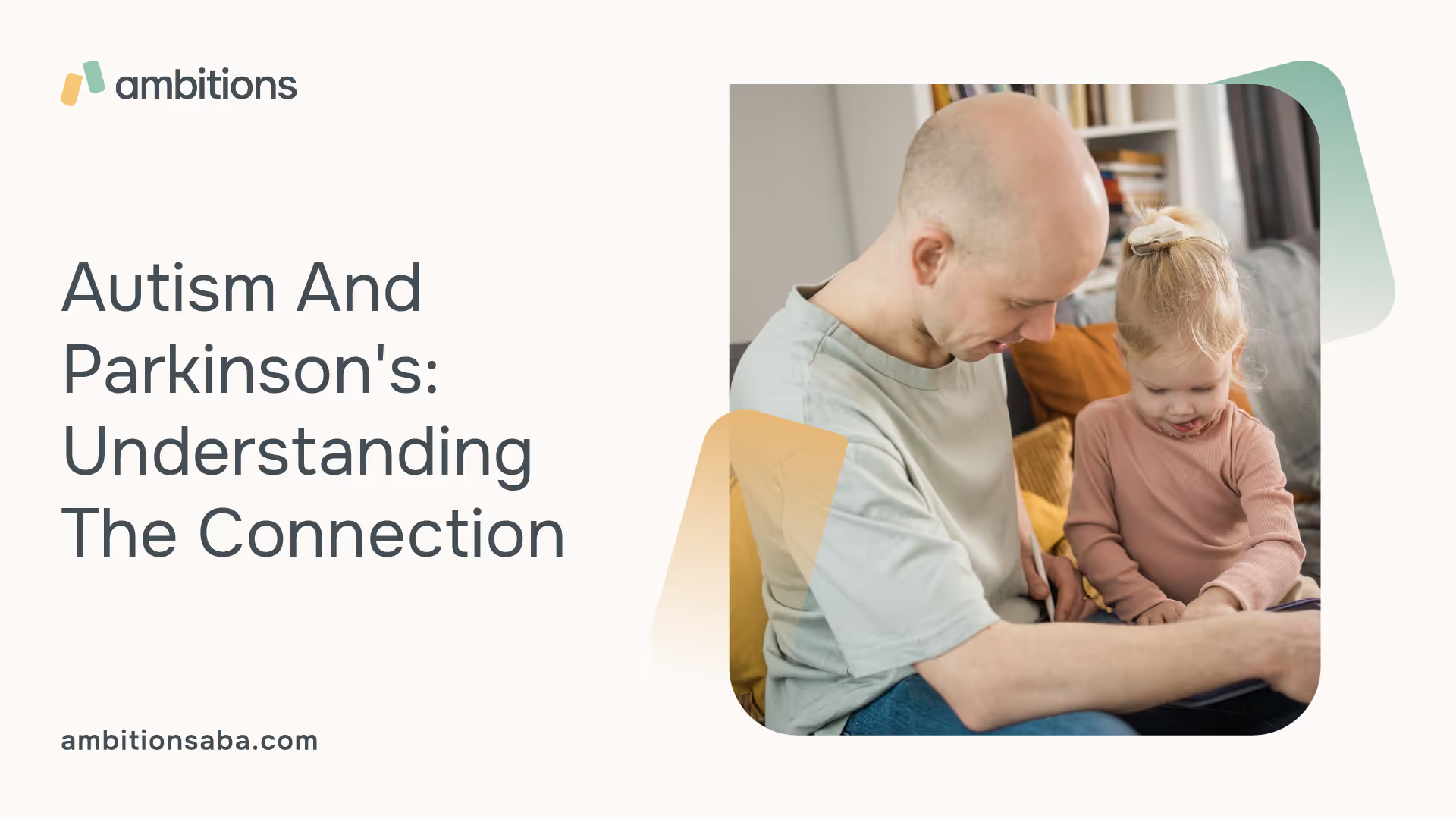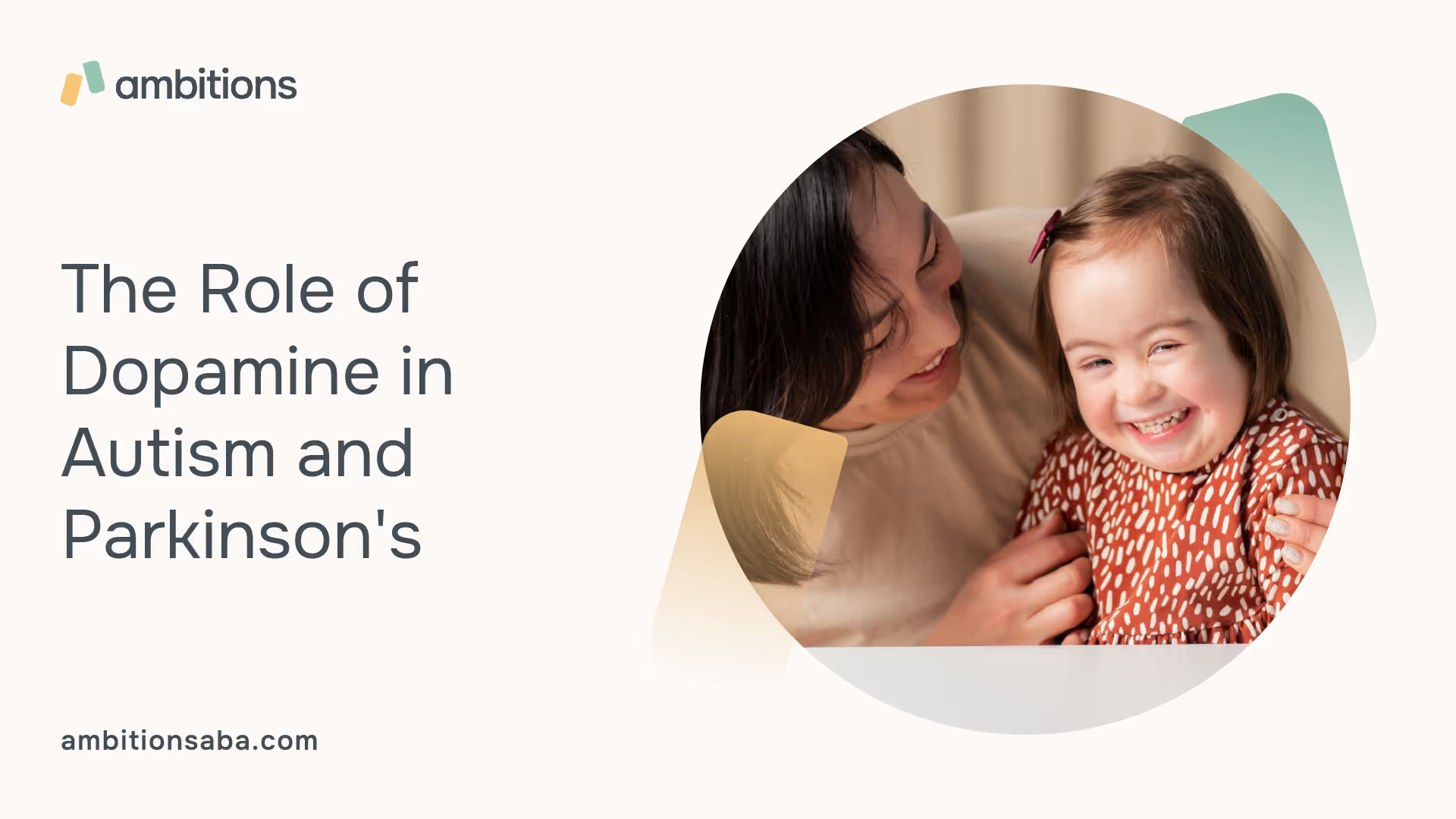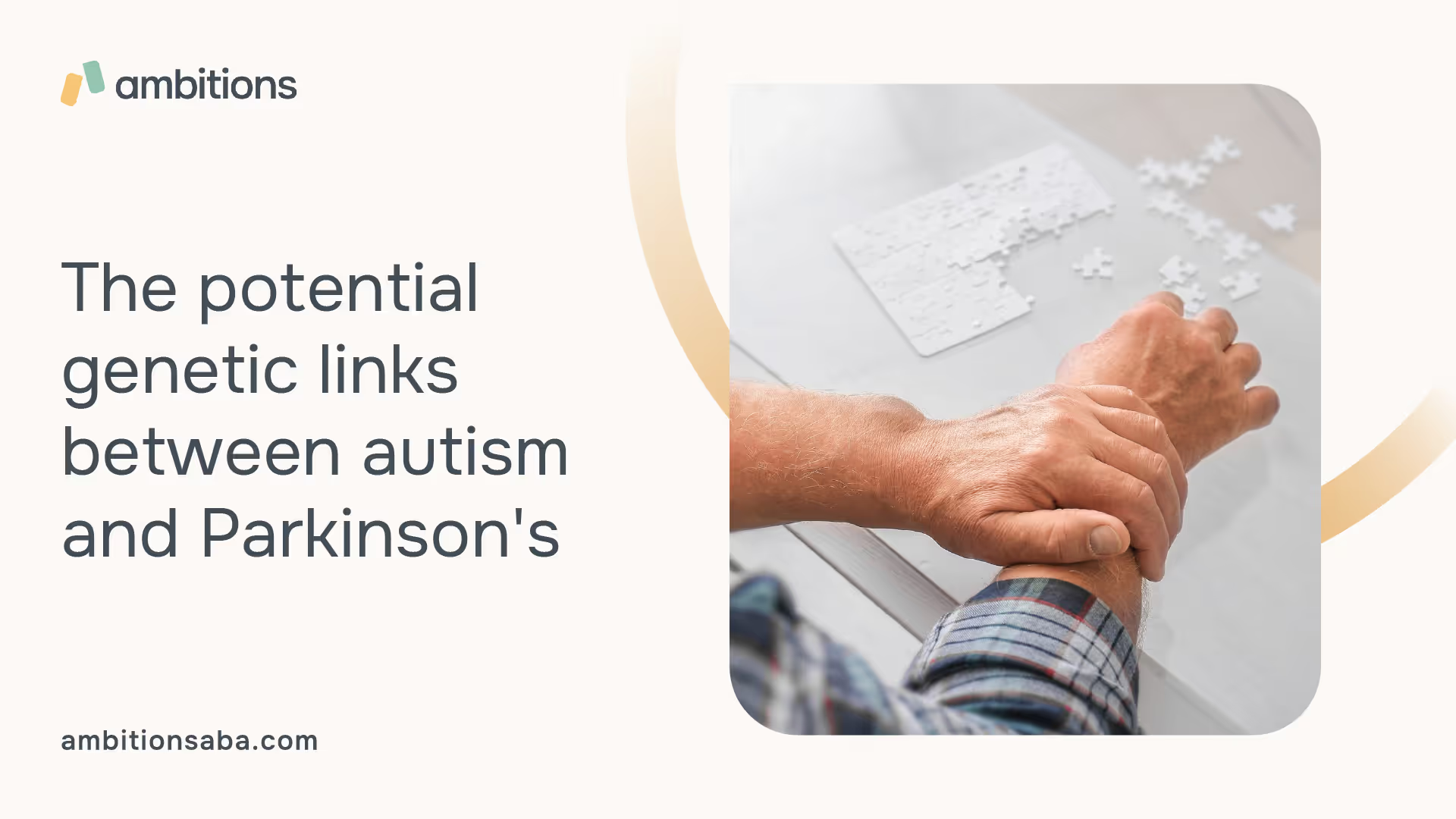Autism And Parkinson's: Understanding The Connection

Are autism and Parkinson's related? This is a question that has puzzled the medical community for years. While the two conditions seem to be vastly different, there is some evidence to suggest that there may be a link between them. In this article, we'll explore the connection between autism and Parkinson's and what it means for those who are affected by these conditions.
What is Autism?
Autism, or autism spectrum disorder (ASD), is a neurodevelopmental disorder that affects communication and behavior. It is typically diagnosed in early childhood and is characterized by symptoms such as difficulty with social interaction, repetitive behaviors, and limited interests or activities. While the exact cause of autism is not known, it is believed to be a combination of genetic and environmental factors.
What is Parkinson's?
Parkinson's disease is a progressive disorder of the nervous system that affects movement. It is typically diagnosed in people over the age of 60 and is characterized by symptoms such as tremors, stiffness, and difficulty with balance and coordination. Parkinson's is caused by the loss of dopamine-producing cells in the brain.
The Connection Between Autism and Parkinson's
While autism and Parkinson's seem to be vastly different conditions, there is some evidence to suggest that they may be related. In particular, researchers have found that people with autism are more likely to have a family history of Parkinson's. Additionally, some studies have found that people with autism may have a higher risk of developing Parkinson's later in life.
One possible explanation for the connection between autism and Parkinson's is that both conditions involve dysfunction in the basal ganglia, a group of structures in the brain that are involved in movement and reward. It is possible that the same genetic or environmental factors that contribute to autism may also contribute to Parkinson's.
What Does the Connection Between Autism and Parkinson's Mean?
While the connection between autism and Parkinson's is still not fully understood, it is clear that there is some overlap between the two conditions. For people with autism, this means that they may have a higher risk of developing Parkinson's later in life. It also means that they may want to be more vigilant about monitoring their health and seeking medical attention if they experience symptoms of Parkinson's.
For researchers, the connection between autism and Parkinson's is an area of active investigation. By better understanding the link between these two conditions, we may be able to develop new treatments or interventions that can benefit people with either condition.

The Role of Dopamine in Autism and Parkinson's
Dopamine is a neurotransmitter that plays a crucial role in the development and function of the nervous system. It is involved in many important processes, including movement, reward, and motivation. In both autism and Parkinson's, dopamine levels are affected in different ways.
In Parkinson's disease, there is a loss of dopamine-producing cells in the brain, which leads to a decrease in dopamine levels. This can cause the characteristic symptoms of Parkinson's, such as tremors and stiffness.
In contrast, some studies have suggested that people with autism may have higher levels of dopamine in certain areas of the brain. This could help explain some of the behavioral characteristics associated with autism, such as repetitive behaviors and restricted interests.
While more research is needed to fully understand the role of dopamine in both autism and Parkinson's, it is clear that this neurotransmitter plays an important part in both conditions. By better understanding how dopamine levels are affected in these disorders, we may be able to develop new treatments or interventions that can improve outcomes for people living with these conditions.

The potential genetic links between autism and Parkinson's
In addition to the similarities in dopamine levels and basal ganglia dysfunction, there may also be genetic links between autism and Parkinson's. Several studies have found that certain genes are associated with both conditions.
For example, a study published in the journal Nature found that mutations in the PTEN gene, which is known to be involved in autism, can also lead to Parkinson's-like symptoms in mice. Another study published in the journal Science Translational Medicine identified a genetic mutation that is associated with both autism and an increased risk of developing Parkinson's.
While these findings are still preliminary, they suggest that there may be shared genetic pathways between autism and Parkinson's. By identifying these pathways, we may be able to develop new treatments or interventions that can benefit people with either condition.
Diet and Nutrition as Potential Factors in Parkinson's Disease Development in Individuals with Autism
There is some evidence to suggest that diet and nutrition may play a role in the development of Parkinson's disease in individuals with autism. One study published in the journal Frontiers in Neuroscience found that people with autism who followed a high-fat, low-carbohydrate ketogenic diet had lower levels of inflammation and oxidative stress, which are both risk factors for Parkinson's disease.
Another study published in the journal PLOS ONE found that people with autism who had higher levels of omega-3 fatty acids in their blood were less likely to develop Parkinson's later in life. Omega-3 fatty acids are found in foods such as fish, nuts, and seeds and have anti-inflammatory properties that may help protect against Parkinson's.
While more research is needed to fully understand the impact of diet and nutrition on the development of Parkinson's in individuals with autism, these studies suggest that dietary interventions may be a promising area for future research. By identifying specific dietary factors that can reduce the risk of developing Parkinson's, we may be able to develop targeted interventions that can improve outcomes for people with both conditions.
The Role of Environmental Toxins in Autism and Parkinson's Disease
There is growing evidence to suggest that exposure to environmental toxins may contribute to the development of both autism and Parkinson's disease. Chemicals such as pesticides, heavy metals, and air pollutants have been linked to an increased risk of developing these conditions.
For instance, a study published in the journal Environmental Health Perspectives found that children with higher levels of exposure to organophosphate pesticides were more likely to develop autism. Similarly, another study published in the journal Neurology found that individuals living in areas with high levels of air pollution were more likely to develop Parkinson's disease.
Although the exact mechanisms by which these environmental toxins contribute to the development of these conditions are not yet fully understood, it is clear that they can have a significant impact on brain function and development. Identifying specific environmental factors that increase the risk of developing autism or Parkinson's disease may help us take steps to reduce exposure and prevent these conditions from occurring in the first place.
Co-occurring Autism and Parkinson's Disease: Challenges in Diagnosis and Treatment
There is also the question of how the diagnosis of one condition may affect the diagnosis and treatment of the other. For example, a person with autism who develops Parkinson's disease may have difficulty communicating their symptoms to healthcare providers, which could lead to delays in diagnosis and treatment. Additionally, some medications that are commonly used to treat Parkinson's may interact with medications used to manage symptoms of autism, making it challenging for healthcare providers to develop an effective treatment plan. It is important for healthcare providers to be aware of these potential challenges and work closely with individuals who have both conditions to ensure they receive appropriate care.
Limited Research on Parkinson's Treatment Effectiveness in Individuals with Autism
There is limited research on the effectiveness of current treatments for Parkinson's disease in individuals with autism. While some studies suggest that people with autism may respond differently to certain medications, such as levodopa, which is commonly used to treat Parkinson's symptoms, more research is needed to fully understand how these treatments work in this population. Additionally, there may be unique challenges in treating Parkinson's in individuals with autism, such as difficulties with communication and sensory processing. As such, it is important for healthcare providers to take a personalized approach when treating Parkinson's disease in individuals with autism and to consider their unique needs and challenges.
Unique Challenges for Individuals with Autism and Parkinson's Disease
Individuals with autism who develop Parkinson's disease may face unique challenges that can have a significant impact on their lives and the lives of their families. Parkinson's symptoms, such as tremors, stiffness, and difficulty with balance and coordination, can exacerbate some of the difficulties associated with autism, such as sensory processing issues and communication difficulties.
Additionally, the progression of Parkinson's disease can be particularly challenging for individuals with autism and their families. As symptoms worsen over time, individuals may require increasing levels of care and support to manage daily activities. This can place a significant burden on caregivers and family members.
It is important for healthcare providers to take a personalized approach when treating Parkinson's disease in individuals with autism and to consider not only their unique needs but also the needs of their families. This may involve working closely with caregivers to develop strategies for managing symptoms and providing support throughout the course of the disease. By taking a holistic approach to care, we can improve outcomes for individuals with both conditions and ensure that they receive the support they need to lead fulfilling lives.
Early Intervention for Autism May Reduce Risk of Parkinson's Disease
Recent studies have suggested that early intervention for autism may have a positive impact on reducing the risk of developing Parkinson's later in life. By addressing the underlying neurological and behavioral issues associated with autism at an early age, it may be possible to prevent or delay the onset of Parkinson's symptoms. While more research is needed to understand this connection fully, these findings highlight the importance of early diagnosis and treatment for individuals with autism. Moreover, these findings could pave the way for new preventative measures against Parkinson's disease.
Resources for Individuals with Autism and Parkinson's
Autism Resources
Autism Society: The Autism Society is a non-profit organization that provides resources, education, and advocacy for individuals with autism and their families. Their website offers information on autism, local chapters, support groups, and events. They also have a national helpline that provides information and referrals.
Autism Speaks: Autism Speaks is another non-profit organization that provides resources, research, and advocacy for individuals with autism and their families. Their website offers information on autism, services and support, research studies, and events. They also have a 24/7 autism response team that provides support to individuals and families.
National Autism Association: The National Autism Association is a non-profit organization that advocates for the rights of individuals with autism. Their website offers information on autism, safety resources, advocacy tools, and support groups.
Parkinson's Resources
Parkinson's Foundation: The Parkinson's Foundation is a non-profit organization that provides resources, research, and advocacy for individuals with Parkinson's disease. Their website offers information on Parkinson's disease, local chapters, support groups, events, and educational materials. They also have a helpline that provides information and support.
Michael J. Fox Foundation: The Michael J. Fox Foundation is a non-profit organization that funds research into Parkinson's disease. Their website offers information on Parkinson's disease, research studies, clinical trials, fundraising events, and educational materials.
American Parkinson Disease Association: The American Parkinson Disease Association is a non-profit organization that provides education, support, and advocacy for individuals with Parkinson's disease. Their website offers information on Parkinson's disease, local chapters, support groups, events, and educational materials.
These are just a few examples of the many resources available for individuals with autism and Parkinson's disease. It's important to seek out resources that are tailored to your individual needs and interests.
FAQs
Is there a cure for either autism or Parkinson's disease?
Currently, there is no known cure for either autism or Parkinson's disease. However, there are treatments and interventions that can help manage symptoms and improve outcomes for individuals with these conditions. It is important to work closely with healthcare providers to develop a personalized treatment plan that meets your unique needs.
Can someone have both autism and Parkinson's disease?
Yes, it is possible for someone to have both autism and Parkinson's disease. While the co-occurrence of these conditions is rare, research suggests that there may be shared genetic pathways between the two disorders. Additionally, some medications used to treat symptoms of autism may interact with medications used to manage Parkinson's, making it challenging for healthcare providers to develop an effective treatment plan.
What are some early signs of Parkinson's disease?
Early signs of Parkinson's disease can vary from person to person but may include tremors or shaking in the hands, arms, legs, or jaw; stiffness in the limbs or trunk; slow movement; difficulty with balance and coordination; and changes in speech or writing. If you experience any of these symptoms, it is important to speak with a healthcare provider as soon as possible.
How can I reduce my risk of developing Parkinson's disease if I have autism?
While more research is needed on this topic, some studies have suggested that early intervention for autism may reduce the risk of developing Parkinson's later in life. Additionally, maintaining a healthy diet and reducing exposure to environmental toxins such as pesticides and air pollutants may also help reduce your risk. It is important to speak with a healthcare provider about ways you can reduce your risk based on your individual circumstances.
What should I do if I think I might have either autism or Parkinson's disease?
If you are concerned that you may have either autism or Parkinson's disease, it is important to speak with a healthcare provider as soon as possible. They can perform an evaluation and recommend appropriate next steps, including referrals to specialists if necessary. Early diagnosis and treatment can help manage symptoms and improve outcomes for individuals with these conditions.
Are there support groups available for individuals with both autism and Parkinson's disease?
While support groups specifically for individuals with both autism and Parkinson's disease may be rare, there are many support groups available for individuals with each condition separately. These groups can provide valuable resources, information, and emotional support for individuals and their families. It is important to seek out resources that are tailored to your individual needs and interests.
Summary
Autism and Parkinson's may seem like vastly different conditions, but there is some evidence to suggest that they may be related. While the exact nature of this connection is still not fully understood, it is an area of active investigation for researchers. For people with autism, it is important to be aware of the potential link with Parkinson's and to seek medical attention if they experience symptoms of the condition. By continuing to explore the connection between autism and Parkinson's, we can better understand these complex conditions and develop new treatments that can improve the lives of those affected by them.



